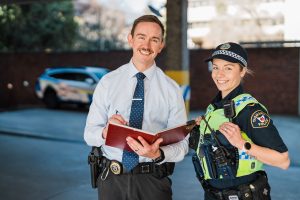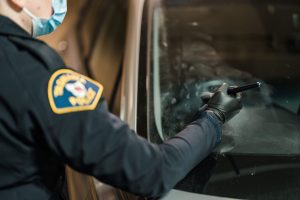Specialists Roles
The majority of Tasmania Police members work as general duties police officers statewide since these roles offer the greatest variety of duties. However, there are also other roles that require further and sometimes ongoing training and usually at least 2 years general duties operational experience as a pre-requisite. Some of those roles are:
Criminal Investigation Branch (CIB) Detectives
Detectives investigate crime and suspected criminal activity; apprehend, charge and give evidence against persons believed to have committed offences; take reports and statements from victims of and witnesses to crime; take control of crime scenes and coordinate staff, resources and specialist groups; and assist specialist police groups in the investigation of complex matters. Prior to being designated a Detective, members must complete a Detective Training course at the Police Academy, transfer to a CIB office and complete a Detective Designation workbook.

Prosecution
Police Prosecutors conduct legal research and present cases on behalf of Tasmania Police and victims in the Magistrates Court. They must successfully complete the Prosecution Training Course and be assigned to a Prosecution Office.
Dog Handlers Squad
Within Tasmania Police, vacancies in the Dog Handlers Squad are highly competitive. Police Dogs are an important part of police operations due to their natural abilities to track people and detect narcotics, explosives or property and their ability to get into places a police member cannot access. A member of the Dog Handlers Squad is not only assigned a police dog who lives at home with them and is their permanent partner to combat crime, but also trains, cares for and works with the dog to assist in police operations.
Crime Scene Officers (Forensic Services)
Crime Scene Officers (CSOs) collect evidence from crime scenes to assist the investigation of volume crime. CSOs take photographs of the scene, write reports, lift fingerprints, examine other sources of evidence and speak to victims, neighbours and other possible witnesses.

Marine and Rescue Services
Work within Marine and Rescue Services may seem like a cruisy job, but members work around the clock to provide security to many ports and respond to search and rescue operations statewide. Included in their patrols are the inland waterways within Tasmania. Marine and Rescue Services coordinate all on-water searches, rescue of vessels and people in distress. They investigate marine related crime, incidents and collisions that occur on the water.
Search and Rescue provide specialist expertise, advice and practical assistance in land search and rescue and the underwater environment. Search and Rescue members are trained to locate people missing in remote and difficult areas. This includes the bush, snow, mountains, coastal and inland waterways, and vertical cliffs. They also dive under water to search for and recover stolen property, weapons, evidence, vehicles and other objects.
Special Operations Group
Members of the Special Operations Group (SOG) are highly trained to ensure that they are always capable of responding to high risk incidents that are beyond the scope of general duties police officers. The SOG are highly trained in antiterrorism tactics, building entry skills, and conducting high risk searches.